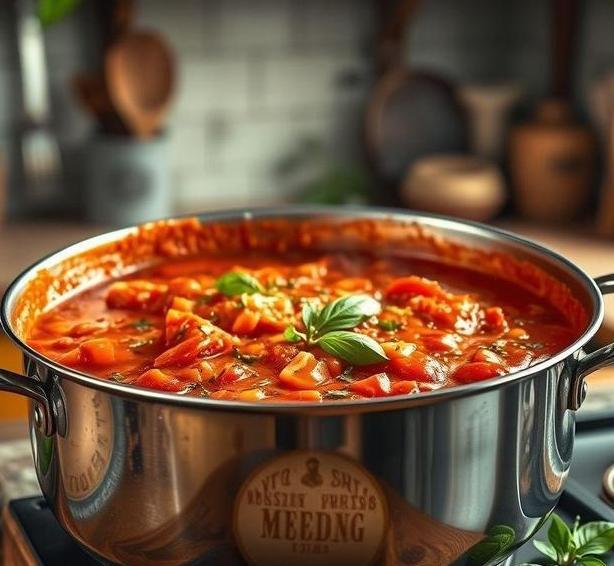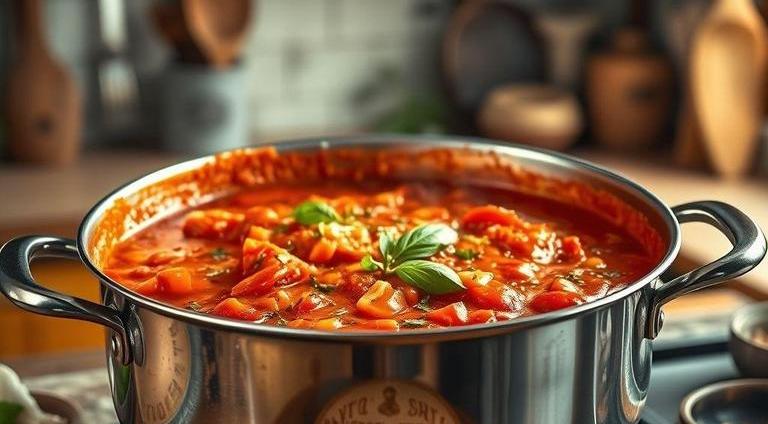Spaghetti sauce-whether it’s marinara, meat sauce, or Alfredo-can elevate any pasta dish from good to mouthwatering. But, as with most food items, there’s a looming question about its shelf life: Can spaghetti sauce go bad? It’s a valid concern, especially if you’re the type who buys a big jar of sauce to keep in the pantry or fridge and forgets about it for a while. So, before you reach for that jar that’s been hanging out in the back of the cabinet, let’s dive into the details of how long spaghetti sauce really lasts, how to spot spoilage, and best practices for storing it.
Can Spaghetti Sauce Go Bad?
Yes, spaghetti sauce can absolutely go bad, like almost any other food item. Despite being made from tomatoes, oil, garlic, and various seasonings-ingredients that are naturally acidic or preservative in nature-the sauce isn’t immune to the ravages of time. In fact, how long it stays good can depend on several factors, including whether the sauce is homemade or store-bought, how it’s stored, and whether it has been opened or not.
Here are the factors that influence whether your spaghetti sauce goes bad:
- Acidity: Tomatoes, the main ingredient in most spaghetti sauces, are highly acidic, which gives the sauce a natural preservative quality. However, this doesn’t make it impervious to spoilage.
- Preservatives: Commercially made sauces often contain preservatives that help extend shelf life. If your sauce is homemade, on the other hand, it doesn’t have these preservatives, making it more prone to spoiling faster.
- Storage conditions: Improper storage can significantly shorten the life of your spaghetti sauce, even if it’s unopened. Storing it improperly can lead to bacterial growth, mold, and unpleasant odors.
Shelf Life For Spaghetti Sauce

The shelf life of spaghetti sauce depends largely on the type of sauce (homemade vs. store-bought) and how it’s stored. Here’s a quick rundown:
Unopened Store-Bought Spaghetti Sauce
-
Pantry (Unopened)
- Best By Date: Unopened jars of commercial spaghetti sauce typically last anywhere from 12 to 18 months when stored in a cool, dry pantry.
- Best Quality: Even after the “best by” date, the sauce can still be good for several months, but its flavor and texture might degrade over time.
Opened Store-Bought Spaghetti Sauce
Homemade Spaghetti Sauce
- Refrigerated: Homemade spaghetti sauce generally lasts for 3 to 5 days when stored in an airtight container in the fridge.
- Frozen: If you’re not going to use it up right away, you can freeze homemade sauce for up to 3 to 4 months. Just be sure to cool it completely before freezing and store it in a freezer-safe container to avoid freezer burn.
Common Signs Of Spoilage
Spaghetti sauce can spoil in a few different ways, and spotting the signs early is crucial for avoiding foodborne illness. Here are the most common red flags that your spaghetti sauce has gone bad:
-
Smell
- Fresh spaghetti sauce typically has a rich, tangy, savory aroma. If it smells sour, rancid, or like fermented garlic, it’s time to toss it. This could indicate bacterial growth or spoilage due to exposure to air.
-
Appearance
- Mold: If you notice any fuzzy, green, or white spots on the surface of the sauce, that’s a clear sign of mold growth. Mold can form on sauces with high moisture content, especially if they’ve been left out at room temperature for too long.
- Discoloration: A dramatic change in color, like a darkening of the sauce, could indicate that it’s gone bad. While some oxidation is normal over time, drastic color changes might signal spoilage.
-
Texture
- If the sauce has become unusually slimy or separated, it’s likely gone bad. While separation of ingredients is normal (especially with homemade sauces), an odd texture that doesn’t go away after stirring could indicate spoilage.
-
Taste
- This is often a last resort for checking spoilage, but if the sauce tastes sour or off in any way, it’s a strong indicator that it’s no longer safe to consume.
How To Store Spaghetti Sauce?

Proper storage is key to maximizing the shelf life of your spaghetti sauce. Whether it’s a jar you just bought or leftover sauce from a big batch, here’s how to store it to prevent spoilage:
Unopened Store-Bought Sauce
- Store in a Cool, Dry Place: Keep unopened jars in a pantry or kitchen cupboard away from heat and light. A consistent, cool temperature will help prolong its shelf life.
- Avoid Freezing: Freezing unopened jars is generally not recommended. The sauce can separate or become watery once thawed.
Opened Store-Bought Sauce
- Refrigerate Immediately: Once you’ve opened the jar, transfer any leftover sauce to the fridge as soon as possible. Store it in an airtight container to preserve its freshness and prevent contamination.
- Seal Tightly: Always tightly seal the jar or container before refrigerating. This helps to prevent air from getting in and causing the sauce to spoil faster.
Homemade Sauce
- Cool Before Storing: Allow homemade sauce to cool completely before refrigerating or freezing. Hot sauce can create condensation inside the container, which can encourage bacteria and mold growth.
- Use Airtight Containers: Store homemade sauce in airtight jars or plastic containers to keep out moisture and air, both of which can lead to quicker spoilage.
- Freezing: If you’re freezing homemade sauce, use freezer-safe containers or freezer bags to keep the sauce fresh for months. Consider portioning it out into smaller servings to make thawing easier.
Expert Tips
- Label Containers: If you’re freezing or storing homemade sauce, always label the containers with the date. This will help you keep track of how long it’s been stored and remind you to use it before it spoils.
- Do Not Let Sauce Sit at Room Temperature: If you’ve served spaghetti sauce at a meal, don’t leave it out for more than two hours. Bacteria love the warm temperature, so refrigerate leftovers promptly.
- Reheat Only Once: When reheating leftover sauce, only reheat the portion you plan to eat. Repeated heating and cooling can cause the sauce to spoil more quickly.
- Check for Packaging Integrity: Before buying store-bought sauce, always check the packaging. A jar that’s dented, cracked, or has a broken seal is more likely to spoil faster.
- Freeze for Longer Storage: If you know you won’t finish your spaghetti sauce within the recommended time, freezing it is a great way to preserve it. You can even freeze individual portions to make reheating easy!
FAQs
Can Spaghetti Sauce Go Bad After Opening?
Yes, spaghetti sauce can go bad after opening. Once opened, it should be refrigerated and used within 5 to 7 days, depending on the brand and preservatives.
How Can You Tell If Spaghetti Sauce Has Gone Bad?
Signs that spaghetti sauce has gone bad include changes in color, a sour or off smell, mold growth, and a change in texture or consistency.
How Long Does Spaghetti Sauce Last In The Fridge Once Opened?
Once opened, spaghetti sauce typically lasts between 5 to 7 days in the refrigerator. However, this can vary based on the ingredients and preservatives used.
Can Spaghetti Sauce Go Bad If Not Refrigerated?
Yes, spaghetti sauce can spoil if not refrigerated. Bacteria grow rapidly at room temperature, and unrefrigerated sauce can become unsafe to eat after just a few hours.
Can Spaghetti Sauce Go Bad In A Sealed Jar?
If unopened and stored properly, spaghetti sauce in a sealed jar can last for 1 to 2 years past its expiration date. However, once opened, it should be treated as any other open sauce.
Can Spaghetti Sauce Go Bad If Frozen?
Freezing spaghetti sauce can extend its shelf life for 3 to 4 months. However, the texture may change after thawing, with separation or a slight grainy feel. It’s still safe to eat as long as it’s stored properly.
What Causes Spaghetti Sauce To Go Bad?
Spaghetti sauce can go bad due to the growth of bacteria or mold, typically caused by exposure to air or improper storage. The high moisture content and acidic nature of the sauce can also contribute to spoilage.
Can You Eat Expired Spaghetti Sauce?
If spaghetti sauce is past its expiration date but has been stored properly, it may still be safe to eat. However, you should check for signs of spoilage such as an off smell, mold, or changes in texture before consuming.
Can Spaghetti Sauce Go Bad If It’s Left Out Overnight?
Yes, spaghetti sauce should not be left out overnight, as bacteria can develop quickly. It’s recommended to refrigerate or freeze the sauce within 2 hours of opening or use.
Is It Safe To Use Spaghetti Sauce After It Has Separated?
If spaghetti sauce separates but doesn’t show signs of spoilage like mold or an off smell, it can still be safe to use. Stir the sauce to re-incorporate the ingredients before use. However, if it smells sour or unusual, discard it.